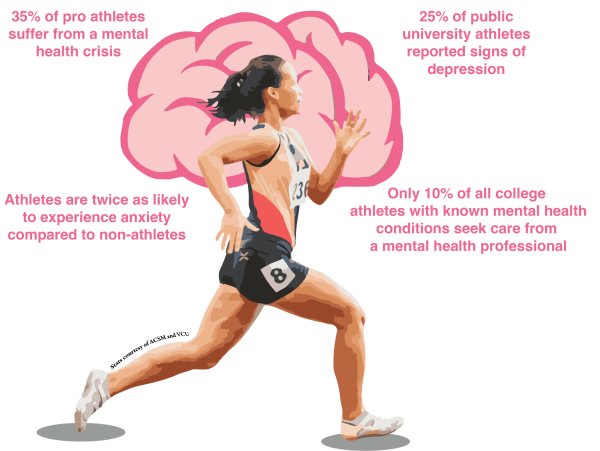
World record holder, 8-time World Swimmer of the Year, Sports Illustrated Sportsman of the Year, most decorated Olympian of all time with 28 medals and one of the greatest athletes in history: Michael Phelps had conquered it all, or so it seemed. Phelps dominated the global swimming stage from 2003 until his retirement in 2016. During that time, he appeared to be invincible. In reality, under every victory, smile and celebration was a man who struggled with depression and anxiety to the point where he didn’t recognize himself as a human being anymore, but rather a swimming machine. After seeking help for substance abuse and suicidal thoughts, Phelps joined the wave of athletes, both professional and amateur, to publicly speak out about their struggles and the stigma surrounding mental health in athletics.
According to the American College of Sports Medicine (ACSM), approximately 35% of professional or elite athletes suffer from disordered eating, burnout, depression and/or anxiety. Professionals are not the only athletes susceptible to these issues, though. ACSM also reports that 30% of female and 25% of male student-athletes at all levels report having stress-induced anxiety.
Mental health is a growing topic in the sports world today and has quickly become a key focus in high school, collegiate and professional programs. Trinity Prep Athletic Director (AD) Collin Sullivan, who was formerly Brown University’s AD from 2015 to January 2023, noted that mental health awareness has been one of the top priorities within the NCAA for a number of years. In 2014, only 25 Division I schools had a full-time licensed mental health practitioner on staff, according to ESPN. Today, the NCAA has ensured that every school across the nation provides athletes with access to a therapist, practitioner or mental health resource.
During his time at Brown, Sullivan had multiple encounters with athletes who were visibly overwhelmed due to their struggles on the field or in the classroom. He believes the main reason student-athletes experience mental health issues is due to their lofty and unrealistic expectations.
“Many athletes expect perfection,” Sullivan said. “When that bar is set so high, that can be a barrier to some people. I think sometimes done is better than perfect as long as the effort’s there. Now that doesn’t mean we shouldn’t strive to be perfect, but I think some people will always evaluate themselves against that standard.”
Another major cause of mental health issues amongst athletes are injuries. Whenever an athlete goes down with an injury, there are certain steps they need to take to return to the playing field. Oftentimes, this will include surgery, rehabilitation or rest.
For athletes whose futures rely on performance, time away from the game proves to be highly detrimental to their mental health. In middle school, high school and college, Kenny McKinley was the best player on his team. After fulfilling his lifelong dream of being drafted to the NFL by the Denver Broncos, McKinley suffered back-to-back knee injuries requiring surgery in his first few seasons. Falling into a deep depression, McKinley tragically chose to take his life at the age of 23 instead of seeking the help he needed. Cases like McKinley’s aren’t uncommon, though. Studies by the Mental Health Foundation and National Institutes of Health (NIH) suggest that athletes are 17% less likely to seek medical help for mental health issues than the average adult.
Prominent Sport Psychologist Dr. Gio Valiente, known for working with some of the top golfers in the world including Justin Rose and Jordan Spieth, believes the best way to solve this issue is by providing young people, both athletes and non-athletes, with a strong support system. Whether it be a family member, psychologist or guidance counselor, having someone trustworthy to talk to is more important than it may seem.
“A base level of anxiety is built into the human condition, and the problem is, anxiety at its highest level can be debilitating,” Valiente said. “I think there’s real value in teaching the next generation how to manage anxiety so it doesn’t get to that point. Having resources like sports psychologists and a caring family is the healthiest way to help people.”
At Trinity, student-athletes face many of the same challenges as professional and collegiate athletes: anxiety, poor time management, unhealthy sleep habits, etc. While they aren’t playing sports to provide for their families like many professionals are, high schoolers yield their own stresses — most notably, college applications. Especially during junior and senior year, rigorous course loads, essays, applications and sports prove to be very stressful. Senior varsity tennis player Lucas Qu mentioned that during the season, he completes his homework whenever he can, even at the tennis court in between games. Because of the unpredictability of high school tennis schedules, Qu often finds himself staying up late at night to get all his work done.
“When games or practice run over time, the first thing on my mind is getting home fast enough to eat, finish my homework and study for tests or quizzes the next day,” Qu said. “It’s pretty overwhelming for me and I know that other people would agree too, but there isn’t much you can do about it.”
While balancing work and athletics is an obvious stressor, studies point to another unexpected factor that plays a role in the performance of athletes: social media. After Simone Biles unexpectedly dropped out of the 2020 Tokyo Olympics due to mental health issues, fellow American Suni Lee captured the gold medal in the gymnastics all-around. Just a day after gaining 250,000 followers on Instagram, 18-year-old Lee performed an imperfect routine and attributed it to “getting distracted.” While this may seem like an excuse to some, studies on athletes have actually shown that social media increases anxiety and impacts performance.
A 2017 NIH study of 298 varying-leveled athletes found that 68.1% had accessed Facebook within two hours of competing. The athletes’ time spent on Facebook was positively correlated with concentration disruption and great sports anxiety. Valiente connects social media’s effect on performance to the mental exhaustion athletes experience when utilizing it, especially before competition or practice.
“The emergence of social media plays a big role in [the performance of athletes],” Valiente said. “People are getting bombarded, it’s called cognitive overload … When people are exposed to images and videos all the time, that screws up the wiring of the brain.”
Additionally, late-night binging on social media impacts another valuable aspect of performance: sleep. A 2019 study published in “Sleep Health” found that NBA players who tweeted from 11 p.m. to 7 a.m. the night before a game experienced a decrease in statistics across the board: namely, poorer shooting accuracy, less playing time, fewer points scored and fewer rebounds.
In the NBA, a single point could mean the difference between a win or loss, which is why teams are increasingly focused on the mental aspect of the game. In a league where every player is physically talented, mentality could set one team apart from the rest. Orlando Magic Assistant Coach Jesse Mermuys, who has served 15 years in the NBA, mentioned that training on the court is just as important as training off of it.
“Mental health is extremely important in any high stress, high pressure industry … [like] the NBA,” Mermuys said. “The game is constantly evolving, and the skill level of this new generation is incredible. One area where players can really separate themselves is the mental part of their performance. At the Magic, we are constantly doing breathwork, meditation and visualization to give our team a competitive advantage.”
However, the benefits that come with prioritizing mental health may not be enough. In many cases, those who look indestructible are even more susceptible to mental health issues: Michael Phelps, Simone Biles, Naomi Osaka, LeBron James and the list goes on. No matter the activity, whether it be athletics or not, being passionate about something comes with a baseline of stress. Recognizing that everyone is human is essential for any athlete to be the best version of themselves.
“There’s a lot of anxiety built into sports,” Valiente said. “It’s just a part of the process of anything you care about or you’re trying to achieve, whether that be sports or something else. If you care about something, it’s always going to come with a little bit of anxiety, but making sure you get help if you need it is more important than anything else.”




